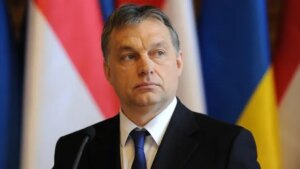The Divisive Energy Crisis: Hungary, Ukraine, and the EU’s Fault Lines

Image Source: Armstrong Economics
In recent months, the political landscape of Europe has become increasingly volatile, spurred on by energy crises and geopolitical tensions. At the forefront is Hungarian Prime Minister Viktor Orbán, who has taken a bold stance against an extension of sanctions on Russia, which presents a significant challenge to the European Union’s unity.
Orbán has openly criticized the EU’s ongoing sanctions regime during an interview with state broadcaster Kossuth Radio, stating, “Now the issue of extending sanctions is on the agenda, I have put on the handbrake and asked European leaders to understand that this cannot continue. Hungary cannot be made to pay the price of sanctions in such proportions.” This statement highlights Hungary’s precarious position, caught between EU obligations and national interests, particularly in the energy sector.
As part of the EU’s framework, all 27 member states are obliged to review and potentially renew sanctions against Russia every six months as long as the war in Ukraine persists. However, this rigid policy framework has profound implications for countries with greater dependency on Russian energy, like Hungary. With approximately €200 billion in Russian sovereign assets frozen and substantial trade barriers in place, the economic ramifications are palpable.
The stakes have risen even further with the recent failure of Ukraine’s President Zelensky to renew a crucial gas pipeline deal, effectively halting Russian gas imports to the EU. Orbán has been quick to seize upon this development, framing it as a significant threat to Hungary’s energy security. “Ukrainians are poking their nose into the flour and tampering with the Hungarians…not allowing gas to flow from Russia to Hungary,” he pointed out, indicating that Ukraine’s sanctions may inadvertently jeopardize Hungary’s energy supplies.

Image Source: Armstrong Economics
Hungary isn’t alone in its plight. Slovak Prime Minister Robert Fico has echoed similar concerns regarding the necessity of Russian energy for his country. He warned that any disruptions in gas transit due to Ukraine’s actions could lead to a severe energy crisis in Slovakia. “There is no EU legislation or system of sanctions that would hinder Ukraine from continuing the gas transit,” Fico stated recently, stressing the need for pragmatic solutions over political posturing.
This intricate web of energy dependence and geopolitical maneuvering has prompted the Hungarian government to request a delay in the sanction renewal process until after the upcoming U.S. elections. Such a delay could offer Hungary the political cover it needs to negotiate its energy needs without facing undue pressure from Brussels, where leaders are increasingly impatient with dissent within the ranks.
The uncomfortable truth is that the European Union—once heralded as a model for cooperative governance—may struggle to act in the best interest of all member states. The fundamental premise of a unified Europe has been questioned, as individual countries like Hungary and Slovakia confront the harsh realities of energy dependency and national sovereignty. As economies grind against the friction of political directives from Brussels, frustration grows.
At Extreme Investor Network, we believe understanding these dynamics is essential for making sound investments in today’s unpredictable environment. The cracks in the EU’s facade may signal the need for strategic positioning in sectors less vulnerable to geopolitical strife, such as renewable energy, technology, and agriculture.
In an age where energy policy and political alignment are precariously intertwined, a thoughtful approach to investment could yield significant rewards—both in financial terms and in contributing to a more resilient economic landscape. We invite you to stay informed through our insights as these events unfold, as the future of the EU and its member states remains a hotbed of opportunity and risk.

